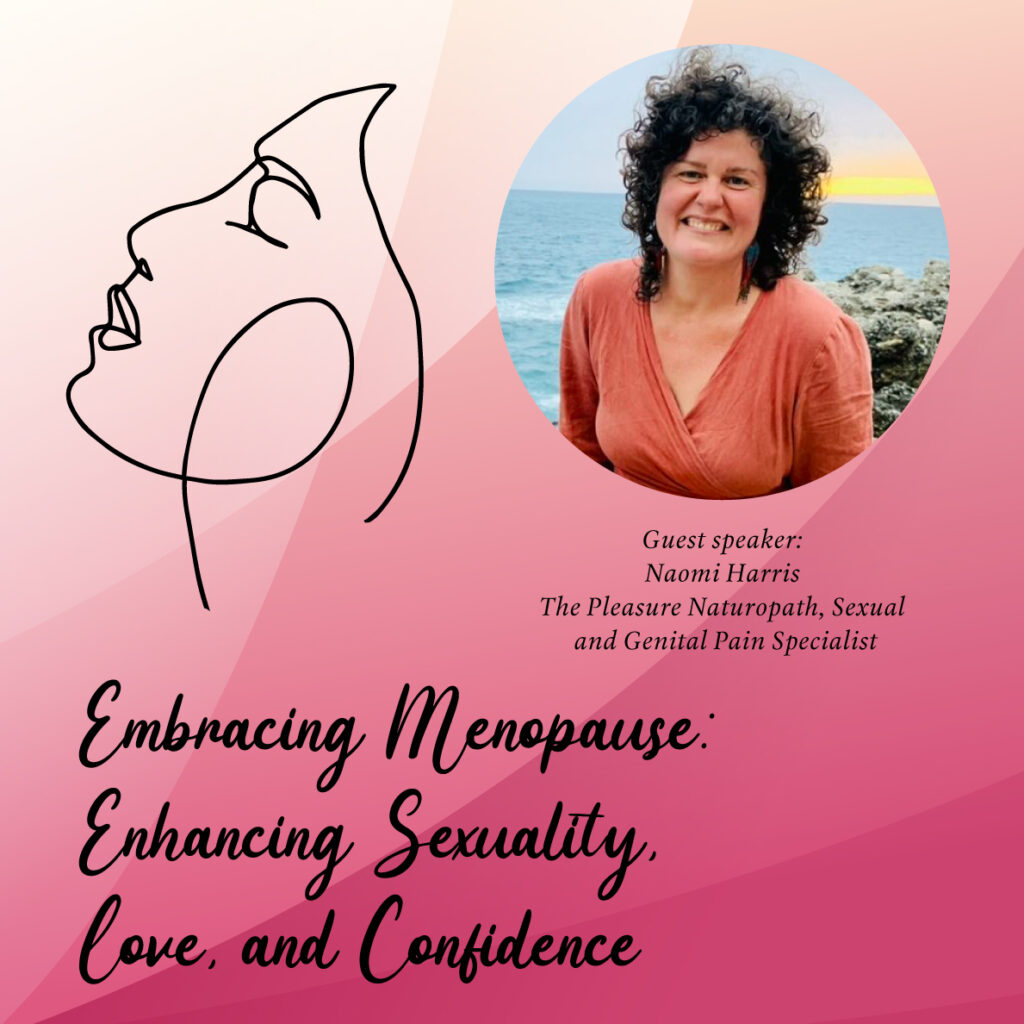Hey there! Today we’re going to talk about menopause & sex. Menopause … It is a whole new phase of life. It can come with some ahem, interesting symptoms like low libido, hot flashes, brain fog and others.
Women spend 1/3 of their life in the postmenopausal stage (Koothirezhi R, 2023). That is a long time! We ought to know more about this time of life …
What is Menopause?
Menopause is called the change of life. It is a natural biological process that marks the end of a woman’s reproductive years. It is when you stop having menstrual cycles. It is defined as 12 months without a menstrual period and the diagnosis is made retrospectively after 12 months of no periods.
What happens during Menopause?
On the one hand, hurrah no more periods! But on the other, menopause brings a whole host of other interesting challenges. During perimenopause, your body starts sending mixed signals, leading to irregular periods and some fun symptoms like hot flashes, mood swings and night sweats.
In menopause, the ovaries stop producing hormones. So, levels of estrogen and progesterone start fluctuating and trend down. Most of the symptoms of menopause are due to the resulting low estrogen.
Does Sex Change After Menopause?
After menopause…. what happens in the bedroom? Well, it depends. For some women, things can get a bit tricky. Estrogen levels drop, which can lead to vaginal dryness and thinning of the vaginal walls. This might make penetrative sex less comfortable. Some women have a lower libido due to the hormonal changes. Night sweats are common in peri- and menopause. They can affect your sleep and may leave you feeling tired with little to no energy for sex. You may have emotional changes during menopause. This may leave you feeling too stressed or upset for sex.
But it’s not all bad news! Some women actually find their sex drive revs up post-menopause, thanks to fewer worries about pregnancy. And with the right lubricant, lifestyle tips and communication, you can still enjoy a satisfying sex life.
Do Women Still Enjoy Sex After Menopause?
It is true that sex can become less enjoyable with certain menopause symptoms. If you experience vaginal dryness, it can make penetrative sex painful. Some women experience a drop in libido due to lower levels of hormones like estrogen and testosterone. With night sweats, sleep can be disturbed. So, some women may be too tired to contemplate sex.
This all sounds quite grim. But the good news is that these symptoms can be addressed. There are many ways to combat vaginal dryness. Invest in a good lube for example. There are ways to rebalance hormones. Evening out your hormone levels will help with the symptoms of dryness, low libido, night sweats and poor sleep. We can use diet, supplements, lifestyle changes and even bioidentical hormone replacement to address the drop in reproductive hormones that comes with the menopause.
What are the Challenges and Solutions women go through with Menopause?
The main challenge is the drop in reproductive hormones. Your body stops producing estrogen, progesterone and testosterone and this can lead to a whole range of changes in the body. This is the cause of symptoms that accompany peri-menopause and menopause.
We can naturally support reproductive hormones with some lifestyle choices. We recommend a few things you can try:
- Diet: Focus on whole foods rich in phytoestrogens. This includes organic soy, flaxseeds, dried fruits (prunes, dates and dried apricots), sesame seeds and legumes to help balance hormones.
- Exercise: Regular physical activity can alleviate symptoms and promote hormonal balance.
- Stress Management: Practice relaxation techniques like meditation, deep breathing or yoga to reduce stress and support hormonal health.
- Sleep: Prioritize quality sleep to regulate hormones and minimize symptoms.
- Herbal Remedies: Black cohosh can help at this time, as can other herbs. It might be best to ask your healthcare provider first.
- Lifestyle: Limit alcohol, avoid too much caffeine, quit smoking and maintain a healthy weight. These will all help to stabilize hormones.
- Communication: Let your partner know what is going on for you. Talk to your partner and explain what you are feeling. Maybe you two can get more creative in terms of longer foreplay or even trying different ways, apart from penetrative sex, to reach orgasm.
- Bioidentical hormone replacement therapy is an option. You will need a doctor’s prescription so see your doctor if you want to take this route.
What helps a Woman’s Sex Drive during Menopause?
The best way to help your sex drive during menopause is to raise your hormone levels and to communicate with your partner. Try the tips we have mentioned to address your hormones naturally. If these don’t work, then talk to your doctor about other ways to replace and boost hormones.
We also recommend you talk to your partner. Once your partner understands what you are going through, the two of you can find solutions to any challenges you may be facing. This can even be an opportunity to come closer together and enjoy more intimate sex.
How often does a 50-year-old Woman want Sex?
Each individual has their own sex drive. Some people have a high sex drive, some have a low sex drive and some people are somewhere in the middle. Turning 50 doesn’t mean you won’t want sex. It is true your libido may decline, but first adjust your diet, lifestyle and communication to keep things hot & steamy in your sex life.
Peri-menopause and menopause can seem to be a tricky time with your body coming up with different symptoms. Going through menopause is a remarkably unique experience for each person. Some women honestly have no issues. Some women have small issues and for some, it can, unfortunately, be a debilitating experience.
But don’t stress. It doesn’t have to be so difficult. There are many natural approaches to try. Start off with the basics of a healthy whole foods diet, daily physical movement, stress management and good sleep. These can all work wonders for any health condition. Try to embrace the change, adapt and remember that it’s all part of the journey!
And if you need more assistance, see your doctor or come talk to us at My Libido Doc. Also, for more information go back to Home Page or check out the following related articles:





